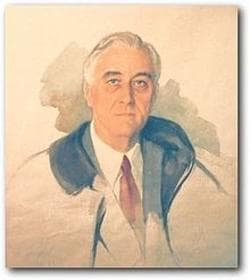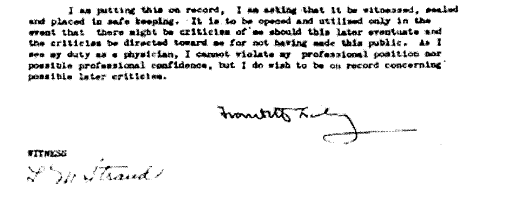Advertisement
Long-Lost 'Lahey Memo' On FDR's Health Unveiled

Wikipedia
A famous FDR portrait interrupted by his deathHistorical conspiracy theorists, here's a juicy one!
The Lahey Clinic is about to unveil a fascinating memo from 1944, in which the clinic's founder, Dr. Frank Lahey, reports that he examined President Franklin Delano Roosevelt and found him far too sick to run for a fourth term. The rest is history: FDR ran anyway, made it through Yalta, and died of a massive stroke on April 12, 1945.
Here's how the memo may have helped shape the course of events, says Dr. John Libertino, director of the clinic's Sophia Gordon Cancer Center: After examining FDR, and noting his ailing health, Dr. Lahey warned the president of the importance of his selection of a vice president. The Democratic party then questioned the left-leaning ideology of the current vice president, helping pave the way for the choice of Harry Truman.
The Lahey Clinic plans to unveil a large copy of the memo — which was hidden away for years in the clinic's safe, then a law office — at a Lahey alumni association meeting tomorrow night. The evening will also feature medical theories from two authors, the Lahey reports:
In his book, Conspiracy of Silence: The Health and Death of Franklin D. Roosevelt, Dr. Harry S. Goldsmith centers his hypothesis around a memo written by Lahey Clinic Founder, Dr. Frank Lahey, after the physician evaluated FDR. The memo, kept secret for many years, suggests that Dr. Lahey warned FDR not to seek a fourth term due to his severe heart failure.
Meanwhile, in their book, FDR’s Deadly Secret, co-authors Steven Lomazow, MD, and Eric Fettmann, blame the president’s death on a dark spot seen over his left eyebrow that they believed to be a form of melanoma.
For the meanwhile, here's a little snippet of the memo, and the Lahey says we can post the whole thing on Monday:
Courtesy of the Lahey Clinic
And here's a lightly paraphrased version of how Dr. Libertino, chair of the clinic's institute of urology, tells this riveting medico-historical yarn:
In 1944, FDR's health was failing dramatically, so much so that there was concern about the prospect that he would run for a fourth term. The Democratic National Committee decided he should run. FDR himself was not sure. The physicians responsible for his care were concerned, but they were responding to the needs of the Democratic party, and the country was in the throes of World War Two. Toward the latter part of March, 1944, it was decided by Admiral McIntyre, the physician in charge of Roosevelt's care on a day-to-day basis, that he would convene two experts to evaluate the president. One was Dr. Frank Lahey, a world-famous surgeon who had gotten to know Roosevelt because he was in charge of recruiting physicians for the military during World War Two.
So Lahey comes down to see Roosevelt, he examines the president, and he determines that the president is not healthy, and if he runs for a fourth term, he will not make it to the end of the term. And he puts this in a memorandum: the party had better be careful who's picked for vice president because he's going to be the president.
Lahey wrote this memorandum to make sure that if anything ever happened to him, it would be on the record that he had told McIntyre and Roosevelt that the president was too sick to run. He didn't want anyone saying that he had pronounced the president healthy. The memo was put in the safe in the event anything happened to Lahey and his reputation was disparaged.
(So wait, I said. So was he worried that there were people who wanted FDR to run who would intentionally distort what he had said?)
This will be part of tomorrow night's event, Dr. Libertino said, "The uncovering of the mystery and the conspiracy." There's no question the people who took care of FDR were not being honest with the public, he said; they were not being honest with anybody.
The fate of the memo is a long and winding tale involving lawyers, an administrative chief and the author, Dr. Harry Goldsmith, who heard about the memo and tracked it down. Dr. LIbertino says he himself was on the trail of the memo for about 15 years. "We all heard it existed but nobody knew what it said," he says.
The memo holds interest as evidence of the medical opinions that helped change history, but also, he says:
"The real issue is: There is a delicate balance between patient confidentiality and national security. Both issues were in play at the time, so some may view this as a conspiracy, as have some authors. But when you consider the circumstances of the country at the time, it was probably either a political or heroic act by FDR.”
